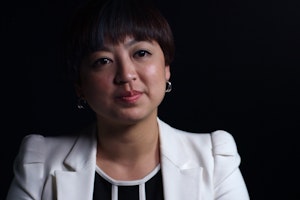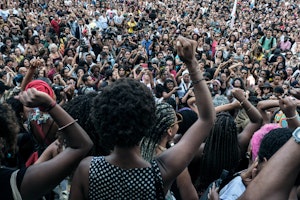Q&A: Inside Taiwan’s Landmark Victory for Same-Sex Marriage

In 40 percent of the world’s countries, homosexual conduct remains criminalized. Still, there are signs of progress. After a protracted struggle—in courts, through a national referendum, and in the legislature—Taiwan became the first place in Asia to recognize the right to same-sex marriage. Joyce Teng, from the Marriage Equality Coalition Taiwan, spoke to the Open Society Human Rights Initiative’s Michael Heflin about the campaign.
Why did you focus on marriage?
Forcing people to live, in effect, underground makes every part of life hard. In Taiwan, marriage and family have high social and cultural significance. Denying LGBTI people the right to form families results in them feeling they are not accepted.
This has an impact on their entire lives, especially their relationships with intimate partners, family, friends, and colleagues. It can create health effects, causing depression.
We saw this campaign as a way to celebrate an important right but also to lift a tremendous burden.
You faced a well-funded opposition. Who opposes the right to marry in Taiwan?
A global collaboration of evangelical churches. They use strategies developed in the United States. They are backed by rich funders—including the owner of HTC, a Taiwanese cell phone company. These church leaders have a huge impact despite the fact that only five to seven percent of Taiwanese people are Christian.
They have been smart about how they organize. They don’t appeal to Christian values or even reveal that they are Christian. Instead, they present themselves as “concerned parents” who are campaigning out of fear for their kids.
This is the first year that everyone can get married in Taiwan. But the process to get here was not straightforward. What happened?
There has been an outpouring of love for same-sex couples since the law passed, but it was not an easy path to get here. Our efforts gained momentum in 2017 when the constitutional court ruled that marriage—which was defined as a union between a “man and a woman”—was unconstitutional because it discriminated against same-sex couples.
At that time, the court gave the government two years to reform the law. During that time, the opposition tried to undercut our progress with an intentionally confusing referendum process.
I personally felt traumatized by this process. There were ten different questions on a nationwide referendum ballot, five related to LGBTI rights. It was hard because your life was on the ballot, and people were voting about whether or not we would be recognized as human beings.
The ballot was so confusing, and we didn’t have enough time or resources to fully explain to voters what was happening. Ultimately, we lost. The opposition hugely outspent us. But in the end, this was a tool-sharpening moment for us. We came out of it with a clearer understanding of how to make our arguments.
This was an intense campaign. Is there a moment that stands out for you?
We were on the street in May 2017 when the constitutional court ruled in our favor. We were holding a rally in favor of LGBTI rights.
We had limited internet, and a huge crowd waiting to hear how the court ruled. So we had to translate the ruling—from dense legal language to a message that everyone could understand.
And it was amazing to realize what the court had done. Equality, in our laws, had never reached beyond gender. But this was an important extension of rights to people who are gay, trans, and nonbinary. This was a huge moment.
What are the next steps for your coalition?
First, we want to address weaknesses in the law. Though it recognizes the right to marry, it does not recognize the rights of same-sex couples to adopt children. They can only jointly adopt children if one of them is the biological parent. The law also limits who you can wed, only allowing Taiwanese LGBTI people to marry each other or someone from a country that recognizes same-sex marriage. So I could marry someone from France but not Japan.
The marriage law has also created a backlash in which those opposed to LGBTI rights are attacking other laws. For example, Taiwan currently has a progressive Gender Equity Education Act that includes curriculum on diversity in terms of gender identity and sexuality. This law has been in effect for 15 years, and its opponents claim it is why many young Taiwanese support LGBTI rights. The opposition is pushing to change the law, and we need to protect it.
We need to continue to organizing and campaigning. The LGBTI rights movement is stronger as a result of the campaign. We learned a lot, including how to speak to people using local values. Tens of thousands of LGBTI people and allies took to the streets and gave their time and money to the campaign, more than had ever been involved in the past. Also, many more LGBTI people came out to their families making a big difference in attitudes.
But the fight is not over. We still need to change hearts and minds and build acceptance in more rural areas and among older people. We also still need to change other laws to protect the rights of all our community, including trans and intersex people. We also want to build the movement’s political power by expanding our grassroots organizing and recruiting LGBTI political candidates who can be role models and continue to fight for our community.
The Marriage Equality Coalition Taiwan is a grantee of the Open Society Foundations.


